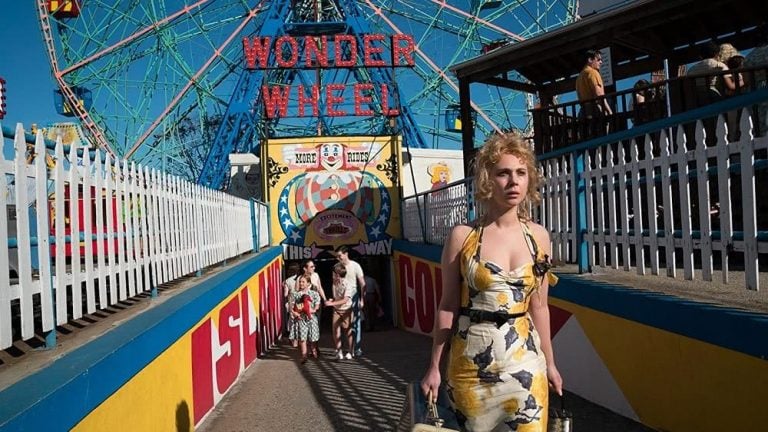There’s an advantage to keeping your hot takes and your reviews separate. Film criticism is one thing, broader societal criticism is another, and never the twain shall meet – and that’s not even to mention the inherent benefit of keeping the artist an arm’s length away from their art. After all, no-one has ever pretended that watching say, a Clint Eastwood film is akin to meeting Clint Eastwood, and an endorsement of someone’s work is not exactly the same as an endorsement of their private life (although, of course, that morally dubious artists benefit financially from praise heaped on their work does muddy the water somewhat.)
But in the case of a film like Wonder Wheel, the latest from the singularly undistinguished Woody Allen, it is impossible to separate the art from its creator’s past controversies. After all, Wonder Wheel is, as this critic discovered amongst much second act cringing, a film about a three-way love triangle between a strapping young wannabe writer (Justin Timberlake, in one of the worst cinematic performances in recent memory), a neurotic Coney Island resident named Ginny (Kate Winslet, trying her best) and her equally bug-eyed daughter-in-law (Juno Temple, the only cast member who just about escapes with their dignity intact.) No. Seriously.
Wonder Wheel reads like a letter sent from a serial killer in order to bait the cops on his trail. It is cryptic, and it is disturbed, and it is about as enjoyable to sit through as a snuff film.
After spending years running as far away as possible from depicting his personal life on the screen, and abandoning his beloved New York in favour of Barcelona and Paris, Allen seems to have finally owned up to his crimes in the strangest possible way. In its lopsided, hysterical melodrama, Wonder Wheel reads like a letter sent from a serial killer in order to bait the cops on his trail. It is cryptic, and it is disturbed, and it is about as enjoyable to sit through as a snuff film.
And even aside from the horrendous connections to real-life transgressions, Wonder Wheel is a mess. Winslet seems to be acting in a different movie from everyone else, doing a dime store version of Cate Blanchett’s excellent turn in Allen’s own Blue Jasmine. Worse still, Allen’s camera won’t stop lingering on her: it holds in excruciating close-ups, looming like a stalker, moving back and forth as she recites overcooked monologue after overcooked monologue.
Presumably everyone involved thought that Winslet was due to snag another Oscar nom, which, given the film’s mixed critical reception, adds an additional layer of uncomfortable tragedy to the proceedings – Winslet has about as much chance as bagging the gong for her work in this film as Ben Affleck does for his turn in Justice League.
That’s not even to mention the film’s bizarre handle on tone. Timberlake, gurning to camera, is the narrator-cum-hero of Wonder Wheel, and spends much of the first half poking his face down the lens like a middle-aged Ferris Bueller. By his character’s own admission, he’s also a hack dramatist, and in his opening speech he apologises for the heavy-handedness of what is set to follow. Which I guess is kinda interesting – it implies that the film will be a post-modern pastiche of itself, and sets up the idea that Allen is out to lampoon half-baked melodrama.
But, bizarrely, within the film’s first half hour, Wonder Wheel suddenly transforms into a half-baked serve of melodrama itself. That initial self-awareness goes out of the window, and all of a sudden, a film that looked like it was going to be a semi-comic unravelling of Eugene O’Neill-style screeching is suddenly something else entirely.
It’s a mess, honestly. It’s ugly, and it’s confusing, and it has all the deftness of touch one might expect from a small herd of bulls locked into a china shop. Avoid it.
Wonder Wheel is in Australian cinemas now. To read a review of a better film out now, check out our thoughts on Paddington 2.


































